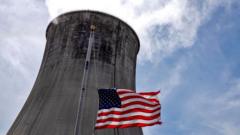China has announced new tariffs on U.S. imports, including coal and natural gas, as a counter-offensive against recent U.S. trade policies, escalating ongoing tensions between the two nations.
China Imposes Tariffs on U.S. Coal and Gaz Amid Trade War Escalation

China Imposes Tariffs on U.S. Coal and Gaz Amid Trade War Escalation
In response to U.S. tariffs, China targets U.S. coal, gas, and more as retaliatory measures kick in.
China has declared it will impose retaliatory tariffs on various U.S. imports starting next Monday. This decision follows U.S. President Donald Trump's implementation of a 10% tariff on all Chinese goods. In its counteraction, Beijing will impose a 15% duty on coal and liquefied natural gas (LNG) from the United States, with further tariffs of 10% applied to crude oil, agricultural machinery, pickup trucks, and large-engine cars. The development signals a deepening trade conflict fraught with repercussions for both countries.
The Chinese government has raised concerns at the World Trade Organization (WTO), alleging that the U.S. is contravening international trade laws. The U.S. administration claims its tariffs are necessitated by a substantial trade deficit with China, alongside efforts to address the flow of fentanyl, a potent synthetic opioid that has become a crisis in the U.S. While Trump attributes the origins of this issue to China and its exports of precursor chemicals, Beijing counters that the problem lies in U.S. domestic policy.
In a statement, China condemned the tariffs, asserting they were counterproductive to solving the underlying issues and detrimental to established economic cooperation. More sanctions from both sides could aggravate the situation further; previously, the Chinese commerce ministry added new entities to its "unreliable entity" list, targeting American companies like PHV Corp and Illumina for their perceived discriminatory practices against Chinese firms.
In response to the trade tensions, China has also put new restrictions on the export of 25 strategic minerals, including tungsten and tellurium, crucial for various industries including aerospace and renewable energy. This endeavor follows an ongoing investigation into Google's operations within China, accusing the tech giant of breaches of competition laws despite limited access to its services in this market.
Both the U.S. and China have levied tariffs on extensive amounts of goods exchanged between them, reaching hundreds of billions of dollars as tension remains high. While Trump has temporarily suspended a planned 25% tariff on imports from Mexico and Canada following negotiations on border security and fentanyl trafficking, uncertainty looms over whether he will reimpose such tariffs after the 30-day period.
With both China and North America making up a significant portion of U.S. imports, the ramifications of these trade tensions could affect decisions by businesses thinking of investing within the U.S. market.
The Chinese government has raised concerns at the World Trade Organization (WTO), alleging that the U.S. is contravening international trade laws. The U.S. administration claims its tariffs are necessitated by a substantial trade deficit with China, alongside efforts to address the flow of fentanyl, a potent synthetic opioid that has become a crisis in the U.S. While Trump attributes the origins of this issue to China and its exports of precursor chemicals, Beijing counters that the problem lies in U.S. domestic policy.
In a statement, China condemned the tariffs, asserting they were counterproductive to solving the underlying issues and detrimental to established economic cooperation. More sanctions from both sides could aggravate the situation further; previously, the Chinese commerce ministry added new entities to its "unreliable entity" list, targeting American companies like PHV Corp and Illumina for their perceived discriminatory practices against Chinese firms.
In response to the trade tensions, China has also put new restrictions on the export of 25 strategic minerals, including tungsten and tellurium, crucial for various industries including aerospace and renewable energy. This endeavor follows an ongoing investigation into Google's operations within China, accusing the tech giant of breaches of competition laws despite limited access to its services in this market.
Both the U.S. and China have levied tariffs on extensive amounts of goods exchanged between them, reaching hundreds of billions of dollars as tension remains high. While Trump has temporarily suspended a planned 25% tariff on imports from Mexico and Canada following negotiations on border security and fentanyl trafficking, uncertainty looms over whether he will reimpose such tariffs after the 30-day period.
With both China and North America making up a significant portion of U.S. imports, the ramifications of these trade tensions could affect decisions by businesses thinking of investing within the U.S. market.


















